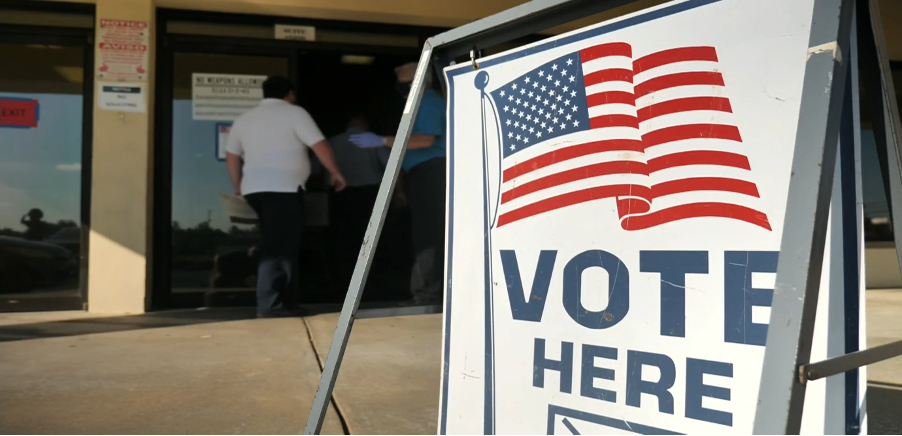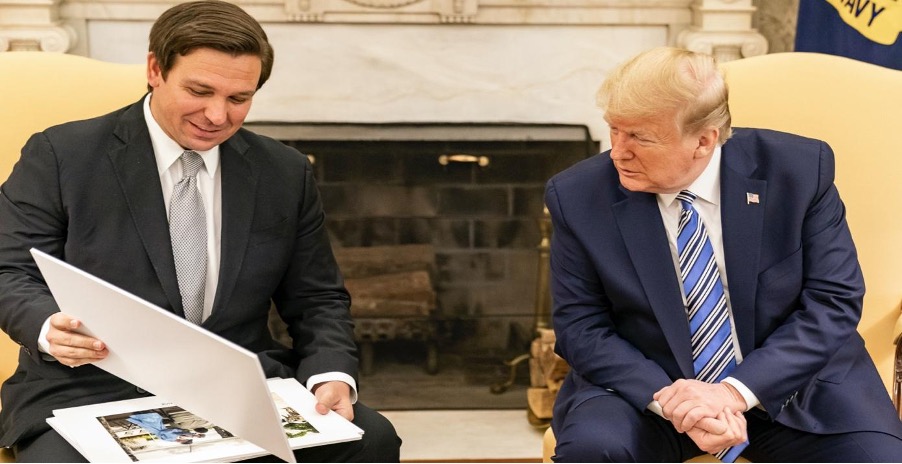Does the upcoming US Presidential election have the potential to stunt ESG investment?
Does the upcoming US Presidential election have the potential to stunt ESG investment?
The ongoing struggle to ensure the continuation and development of Environmental, Social and Governance issues, through investment products and portfolios can be partly attributed to high interest rates and rising energy prices, exacerbated by the energy insecurity triggered by geo-political conflicts in Europe and the Middle East. However, a key issue often overlooked, is the polarisation of ESG in US politics, where opposing sides of the political spectrum have used policy amendments to ascertain their party values in the field of investment.
This article takes a focus on the potential implications of the outcome which follows the upcoming US Presidential election, and its respective candidate policies on ESG-based investment. With 78% of Democrats viewing climate change as a major threat, rivalled by 23% of Republicans. While, analysing some of the damage already accomplished by the anti-ESG movement on a state and federal level, with net inflows into sustainable funds remaining negative for the 4th consecutive quarter, as of Q3 2023.
And, 2024 entails a series of important elections, with over 2 billion voters expected to head to the polls throughout the course of the year. However, as a global hub of investment, markets have placed focus on the US Presidential election, taking place on the 5th of November 2024. While there is ambiguity around what potential anti-ESG policies would actually materialise in legislation. Investment; banks, products and projects who are linked to and consider ESG implications within their investment processes are likely to suffer from headwinds, should a Republican candidate emerge victorious.

The World Resources Institute recently highlighted through a ‘State Climate Action’ report in November 2023, that efforts to keep global temperatures within 1.5 degrees of pre-industrial levels, are failing. In the weeks following, the International Energy Agency stated that measures and pledges taken during the Cop 28 summit “Won’t be enough on their own to limit global warming to 1.5 degrees Celsius”. As such, any continuation of, or acceleration of, anti-ESG legislation within the US, which has been impacted by political polarization within US politics, could damage years of progress. With an adviser to Donald Trump, Carla Sands stating, “On the first day of a second Trump administration, the president has committed to rolling back every single one of Joe Biden’s job-killing, industry-killing regulations”. Referring to Joe Bidens ‘Climate Law’, the $369bn allocated to facilitating investment in green technologies through his ’Inflation Reduction Act’, by offering subsidies, grants, and tax credits. An act which many Republicans believe alongside economic inefficiency, will create a further dependency on Chinese imports. As China currently controls a staggering 90% of the world’s graphite supply, the main mineral used to produce batteries for electric vehicles. Other presidential candidates such as Ron DeSantis, the governor of Florida are also “waging war on woke power-grabs like ESG” and are already involved in green divestment.
Conversely, the Biden administration recently announced plans to exclude the direction of any tax credits towards Foreign Entities of Concern (FEOC’s) including China, in relation to the production of EV batteries. In addition to the domestic subsidisation of $6bn within the production and mineral collection for EV batteries, as such, some of the initial concerns appear unbased.

The term coined to the efforts of many Republican States who try and reverse the movement of US energy investment away from fossil fuels, and towards greener alternatives is labelled ‘Red State Resistance’. Often achieved by implementing policies centred around restricting the ability of state pension funds to take Environmental, Social and Governance factors into consideration when making investment decisions. While pushing the divestment of shares and equity in assets that are already held on the basis of their ESG screens.
On a nationwide level resistance has been carried out through global policies, such as, the withdrawal of the United States from the Paris Climate Accords on the 4th of November 2020. A policy reversed by Joe Biden during his first day in office, which remains a key issue in the upcoming election, and has been a focal point in the polarisation of climate change within affairs of the state.
A prominent example of ‘Red State Resistance’, which likely accelerated and encouraged the passing of more recent bills, to restrict ESG considerations within state pensions, is Texas. In 2021 the Texas legislator passed a bill which requires state pension and school funds to divest equity in companies included in a state list, constructed by Comptroller Glenn Heggar, under the name “Financial Companies that Boycott Energy Companies”. Which blacklists 10 large financial institutions, including Blackrock, Schroders, HSBC and UBS, as well as a further 354 specific investment funds, of which Blackrock and its child company iShares account for 19.8% (70). For perspective there are 661 sustainable open ended and exchange traded funds in the US, as of Q3 2023.
Legislature to prohibit, minimize and marginalise the consideration of ESG is not contained to Texas. To the contrary, as of August 2023, of the 22 states which have introduced a form of ESG legislation, 18 have implemented anti-ESG policies. A 19 state alliance was formed on March the 16th 2023 to ‘protect’ American citizens’ economic interests from the ‘woke’ ESG movement including Alabama, Alaska, Arkansas, Georgia, Idaho, Iowa, Mississippi, Missouri, Montana, Nebraska, New Hampshire, North Dakota, Oklahoma, South Dakota, Tennessee, Utah, West Virginia, and Wyoming, all banding to fight so-called ESG agendas. Of the 19 states included, Florida, governed by Presidential candidate DeSantis has arguably implemented the most draconian legislation. Signing Florida’s House Bill 3, effective as of the 1st of July 2023 which states that ESG criteria cannot be considered when formulating; public pension, local government, and contracting, investment decisions. Furthermore, prohibiting the issuance of ESG bonds, debt which is used to fund projects with positive ESG impacts. DeSantis and the state of Florida were also previously successful in assembling a $2bn exit from Blackrock, due to the institution’s ESG-based investing activities.

With Blackrock alone experiencing $4bn in outflows in various US states due to ESG backlash during 2022, the additional risk of government intervention creates additional headwinds for asset managers. In anticipation of the upcoming election, and the current significant political pressure on Blackrock, being branded by Florida Governor Ron DeSantis as using its "economic power" to instil a "left wing agenda”. Larry Fink, CEO of Blackrock has discarded his use of the term ‘ESG’, to avoid its weaponization in US politics. Although recent data also uncovered, in the year leading up to June 2023 Vanguard backed just 2% of Environmental and Social proposals introduced by shareholders while Blackrock voted roughly 7% in favour, down from 12% and 22% respectively. While we cannot solely attribute the individual decisions of asset managers to US politics, pressure from political organisations, who have the power to withdraw and divest, could be holistically reducing the intensity as to which financial institutions in the region manage their environmental, and sustainable investment strategies.
Backlash from Republican lawmakers may create short term noise in US investment markets; however, a Bloomberg Intelligence survey suggests that global investors continue to regard ESG doctrines as a means of not only enhancing our future landscape, but that 85% of surveyed investors believe the principles lead to, “better returns. resilient portfolios and enhanced fundamental analysis”. Furthermore, while the anti-ESG movement may be branded as a measure to protect American jobs and the national economy, Federal Reserve Economist Ivan Ivanov has stated that Texas’s anti-ESG laws alone are costing the state as much as $416 million per year. While the latest National Climate Assessment suggests that extreme weather fuelled by climate change is costing the USA c.$150 billion a year. Hence, investors both concerned with the generational issue of climate change, and those looking to implement ESG within their strategic asset allocations may find solace, that in the long-term global governments will have to address the UN declared ‘climate emergency’. Whether this arises due to domestic economic incentives, global pressure, or a combination of both, remains unknown .
The short-term effects on policy reversal and investor sentiment which may arise as a result of an ‘anti-ESG’ US President do have the potential to cause disruption within sustainable investment. However, the extent to which this could affect private and institutional investors is likely to be less significant as nation-wide restrictions on the direction of capital investment would be unfeasible. Nonetheless, the effect on state governed funds could disrupt ESG investment inflows and compromise risk management for the concerned asset managers.
Bibliography
Acres , Tom . “2024 Is World’s Biggest Election Year Ever - and AI Experts Say We’re Not Prepared.” Sky News, 19 Dec. 2023, news.sky.com/story/2024-is-worlds-biggest-election-year-ever-and-ai-experts-say-were-not-prepared-13030960. Accessed 27 Dec. 2023.
Blinken, Antony. “The United States Officially Rejoins the Paris Agreement.” United States Department of State, 19 Feb. 2021, www.state.gov/the-united-states-officially-rejoins-the-paris-agreement/. Accessed 27 Dec. 2023.
Boehm, Sophie, et al. “State of Climate Action 2023.” Www.wri.org, 2023, www.wri.org/research/state-climate-action-2023.
Costa, Moriah. “Will the Anti-ESG Movement Hurt Efforts to Implement Climate Disclosures?” Green Central Banking, 13 Sept. 2023, greencentralbanking.com/2023/09/13/anti-esg-movement-climate-disclosures/. Accessed 27 Dec. 2023.
Darbyshire, Madison, and Brooke Masters. “Vanguard’s Backing for Green and Social Proposals Falls to 2%.” Financial Times, 28 Aug. 2023, www.ft.com/content/4313afe4-1fee-447d-b05b-0c8c38cfbff1. Accessed 27 Dec. 2023.
Davies, Matt. “ESG Is Here to Stay, Investors Say.” Impakter, 10 Nov. 2023, impakter.com/esg-is-here-to-stay-investors-say/. Accessed 27 Dec. 2023.
Dickie , Gloria . “COP28 Pledges so Far Not Enough to Limit Warming to 1.5C -IEA.” Reuters , Reuters , 10 Dec. 2023, www.reuters.com/business/environment/cop28-pledges-so-far-not-enough-limit-warming-15c-iea-2023-12-10/. Accessed 27 Dec. 2023.
E. Cicconi, Martine , and Mark R. Herring. “Florida Enacts Anti-ESG Legislation – House Bill 3 Explained.” Akin Gump Strauss Hauer & Feld LLP - Florida Enacts Anti-ESG Legislation – House Bill 3 Explained, 19 May 2023, www.akingump.com/en/insights/alerts/florida-enacts-anti-esg-legislation-house-bill-3-explained. Accessed 27 Dec. 2023.
Eddy, Jennifer A. Smokelin, Sara M. “A Nation Divided: The ESG Fight at the Federal and State Level.” EHS Law Insights, 17 Aug. 2023, www.ehslawinsights.com/2023/08/a-nation-divided-the-esg-fight-at-the-federal-and-state-level/#:~:text=18%20of%20these%20states%20have. Accessed 27 Dec. 2023.
Environment, U. N. “The Climate Emergency.” UNEP - UN Environment Programme, 25 Feb. 2022, www.unep.org/climate-emergency. Accessed 27 Dec. 2023.
“Financial Companies That Boycott Energy Companies.” Texas.gov, 2023, comptroller.texas.gov/purchasing/docs/divest-energy.xlsx. Accessed 27 Dec. 2023.
Friedman, Lisa. “U.S. Quits Paris Climate Agreement: Questions and Answers.” The New York Times, 4 Nov. 2020, www.nytimes.com/2020/11/04/climate/paris-climate-agreement-trump.html. Accessed 27 Dec. 2023.
Garrett, Daniel, and Ivan Ivanov. “Gas, Guns, and Governments: Financial Costs of Anti-ESG Policies.” SSRN Electronic Journal, 2022, https://doi.org/10.2139/ssrn.4123366. Accessed 27 Dec. 2023.
Holland, Makenzie . “2024 Election to Shape U.S. Climate Policy’s Fate | TechTarget.” CIO, 11 Sept. 2023, www.techtarget.com/searchcio/news/366551713/2024-election-to-shape-US-climate-policys-fate. Accessed 27 Dec. 2023.
Home , Andy . “US Looks to Shut China out of Its Battery Supply Chain.” Reuters , 6 Dec. 2023, www.reuters.com/markets/commodities/us-looks-shut-china-out-its-battery-supply-chain-2023-12-05/. Accessed 27 Dec. 2023.
Kerber, Ross. “Florida Pulls $2 Bln from BlackRock in Largest Anti-ESG Divestment.” Reuters, 1 Dec. 2022, www.reuters.com/business/finance/florida-pulls-2-bln-blackrock-largest-anti-esg-divestment-2022-12-01/. Accessed 27 Dec. 2023.
Liu, Siyi , and Dominique Patton . “China, World’s Top Graphite Producer, Tightens Exports of Key Battery Material.” Reuters , 20 Oct. 2023, www.reuters.com/world/china/china-require-export-permits-some-graphite-products-dec-1-2023-10-20/#:~:text=China%20is%20the%20world’s%20top,charged%20portion%20of%20a%20battery. Accessed 27 Dec. 2023.
Masters , Brooke , and Patrick Temple-West. “Companies Attack Texas over “Politicised” ESG Blacklist.” Financial Times, 29 Aug. 2022, www.ft.com/content/8031aaad-efc6-4829-ac02-bd9c151974f4.
Nguyen, Lananh, and Simon Jessop. “Davos 2023: BlackRock U.S. Inflows Dwarf $4 Bln Lost in ESG Backlash -CEO.” Reuters, 17 Jan. 2023, www.reuters.com/business/finance/davos-2023-blackrock-us-inflows-dwarf-4-bln-lost-esg-backlash-ceo-2023-01-17/. Accessed 27 Dec. 2023.
Randall , David . “BlackRock’s Fink Pushes Back after Firm Criticized in Republican Debate.” Reuters , 7 Dec. 2023, www.reuters.com/business/blackrocks-fink-pushes-back-after-firm-criticized-republican-debate-2023-12-07/#:~:text=Overall%2C%20the%20firm%20lost%20about,a%20%22left%20wing%20agenda.%22. Accessed 27 Dec. 2023.
Smyth, Jamie, and Aime Williams. “Donald Trump Would Gut Joe Biden’s Landmark IRA Climate Law If Elected.” Financial Times, 23 Nov. 2023, www.ft.com/content/ed4b352b-5c06-4f8d-9df7-1b1f9fecb269.
Staff. “Governor Ron DeSantis Leads Alliance of 18 States to Fight against Biden’s ESG Financial Fraud.” Flgov.com, 16 Mar. 2023, www.flgov.com/2023/03/16/governor-ron-desantis-leads-alliance-of-18-states-to-fight-against-bidens-esg-financial-fraud/. Accessed 27 Dec. 2023.
Stankiewicz, Alyssa . “Sustainable Funds Hit by Weaker Demand in Q3 2023.” Morningstar, Inc., 23 Oct. 2023, www.morningstar.com/sustainable-investing/sustainable-funds-hit-by-weaker-demand-amid-rising-energy-prices-political-backlash. Accessed 27 Dec. 2023.
---. “Sustainable Funds Hit by Weaker Demand in Q3 2023.” Morningstar, Inc., 23 Oct. 2023, www.morningstar.com/sustainable-investing/sustainable-funds-hit-by-weaker-demand-amid-rising-energy-prices-political-backlash. Accessed 27 Dec. 2023.
TAMBORRINO, KELSEY . “Biden Celebrates as Climate Law Marks First Year.” POLITICO, 16 Aug. 2023, www.politico.com/news/2023/08/16/biden-ira-climate-law-anniversary-00111471. Accessed 27 Dec. 2023.
U.S. Embassy Singapore. “FACT SHEET: Biden-Harris Administration Releases Fifth National Climate Assessment & Announces More than $6 Billion to Strengthen Climate Resilience.” U.S. Embassy in Singapore, 15 Nov. 2023, sg.usembassy.gov/fact-sheet-biden-%E2%81%A0harris-administration-releases-fifth-national-climate-assessment-announces-more-than-6-billion-to-strengthen-climate-resilience/. Accessed 27 Dec. 2023.
“United States of America - $369 Billion in Investment Incentives to Address Energy Security and Climate Change | Investment Policy Monitor | UNCTAD Investment Policy Hub.” Investmentpolicy.unctad.org, 16 Aug. 2022, investmentpolicy.unctad.org/investment-policy-monitor/measures/4004/-369-billion-in-investment-incentives-to-address-energy-security-and-climate-change-.